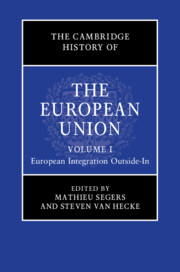Book contents
- The Cambridge History of the European Union
- The Cambridge History of the European Union
- The Cambridge History of the European Union
- Copyright page
- Contents
- Figures
- Contributors to Volume I
- Acknowledgements
- Abbreviations
- Reflections on the History and Historiography of European Integration
- Part I Critical Junctures
- Part II Multilateralism and Geopolitics
- Part III Perspectives and Ideas
- Networks and Attitudes
- Thinking and Memory
- 21 Ideas of Europe: A View from Inside-Out, the 1880s to the 1910s (and Beyond)
- 22 Beginning with Culture: A Certain Idea of Europe
- 23 The European Union and Memory
- Culture and Religion
- Index
- References
21 - Ideas of Europe: A View from Inside-Out, the 1880s to the 1910s (and Beyond)
from Thinking and Memory
Published online by Cambridge University Press: 21 October 2023
- The Cambridge History of the European Union
- The Cambridge History of the European Union
- The Cambridge History of the European Union
- Copyright page
- Contents
- Figures
- Contributors to Volume I
- Acknowledgements
- Abbreviations
- Reflections on the History and Historiography of European Integration
- Part I Critical Junctures
- Part II Multilateralism and Geopolitics
- Part III Perspectives and Ideas
- Networks and Attitudes
- Thinking and Memory
- 21 Ideas of Europe: A View from Inside-Out, the 1880s to the 1910s (and Beyond)
- 22 Beginning with Culture: A Certain Idea of Europe
- 23 The European Union and Memory
- Culture and Religion
- Index
- References
Summary
In 1832, the Prussian novelist Gotthilf August von Maltitz published a curious epistolary novella, the Journey among the Ruins of Old Europe in the Year 2830. Telling of a journey of an American tourist to Europe to visit its ruins and learn about its past, von Maltitz meant this to be a ‘serious and satirical’ work. In it, Europe was a devastated land, invaded and despoiled by hordes from the East, the Russians first and foremost. Its peoples had been easily subdued because of their weakness after centuries of decadence, brought about by their materialism and individualism. In the novella, the comparison between Europe and the United States was a grim one indeed. Von Maltitz’s text, now a forgotten literary curiosity, was rather unusual in its day, and few of its readers would have seen in it a serious foreshadowing of European decline. In truth, the nineteenth century was an age of unprecedented economic, military and cultural expansion for Europe. Admittedly, Alexis de Tocqueville claimed that its nations had attained the acme of their power and that Russia and the United States, ‘called by a secret design of Providence’, would one day hold in their hands the destinies of the world. Yet few others, at that time and for the best part of the century, were so prescient.
- Type
- Chapter
- Information
- The Cambridge History of the European Union , pp. 536 - 560Publisher: Cambridge University PressPrint publication year: 2023



